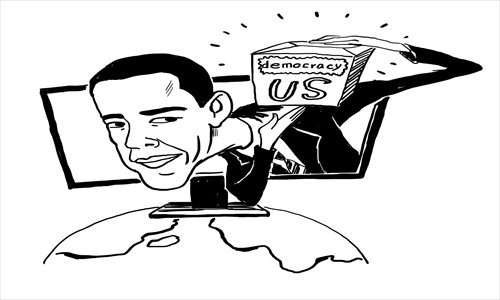US democracy no solution for ethnic issues

US presidents can't speak modestly about US democracy, nor can they see it as peculiar to the US.
President Barack Obama is not exception. During his latest trip in Thailand, he made a similar statement, "It's worked for us for over 200 years now, and I think it's going to work for Thailand and it's going to work for this entire region. And the alternative, I think, is a false hope that, over time, I think erodes and collapses under the weight of people whose aspirations are not being met."
But in reality, there are no panaceas. Obama's declaration sounded like former US president George W. Bush's anti-terrorism declaration a decade ago that you were either "with us or against us."
While US democracy is deemed the only prescription for all problems in reform and development, and as a line that divides the world, its true value is greatly reduced.
What Southeast Asian countries, such as Thailand and Myanmar, need most at the moment is absolutely not to decide whether they'll adopt democracy or to pick a side. What they need most is to find a path that best suits their actual national situation and to build a "social contract" that all ethnic groups and social levels agree too. This is, fundamentally, a problem of system and culture.
Over the past year, I have visited eight Southeast Asian countries, all of which have problems of ethnic integration. The most prominent issue is Muslims' integration with Buddhists or other ethnic groups.
So far I haven't seen one single ASEAN country that has properly and comprehensively solved the problem.
All these countries practice multi-party systems and have "one-man, one-vote" election systems. Myanmar is a latecomer in this regard, and its parliament is still controlled by the military, but after all the opposition party led by Aung San Suu Kyi has entered the congress.
But as letting Buddhist believers tolerantly accept the Rohingya people and letting Rohingyas participate in Myanmar's democratic life is not something that can be addressed by elections.
Here is the one possible ultimate result of practicing democratic elections in a country with divided ethnic groups: One ethnic group, with the largest population, gains power, which further exacerbates ethnic divisions.
There are also other lessons in Southeast Asia.
In order to woo voters, some purposely instigate conflicts between different social levels and ethnic groups, and even replace law with their own religious rules so as to edge other ethnic groups.
The US is a country of immigrants, with Christians as the social majority. Its political system and basic values were also established upon the foundation of European civilization. Like the motto printed on the Great Seal of the US says, "E pluribus unum," which literally means "Out of many, one."
We have to be cautious in applying the US model to the East, especially to Southeast Asia where two of the world's largest religions, Islam and Buddhism, converge.
There is a sense of urgency in Obama's emphasis of US democracy's effects. US influence has actually declined to a level that makes him nervous.
Even ordinary people can see this. According to a recent AP report, "Even as Obama traipsed in stocking feet through a temple in the heart of Bangkok, a monk wished him luck negotiating the deficit-reduction challenge awaiting him in Washington."
The author is a senior editor with People's Daily. He's now stationed in Bangkok. dinggang@globaltimes.com.cn